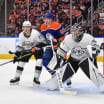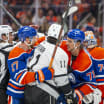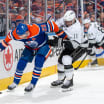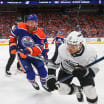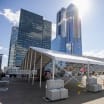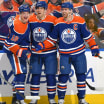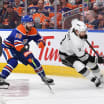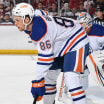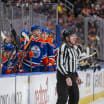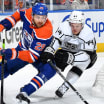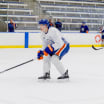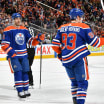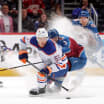"We've lost another soldier."
Those were the words David Pelletier, former Olympic Gold Medalist in pairs figure skating and Oilers Skating Coach, and his parents would dread hearing as another announcement was broadcast over the radio in 2008.
FEATURE: Heroes beyond hockey
HHC Oilers alumni team players Garry Unger and David Pelletier's support for the military transcends the rink
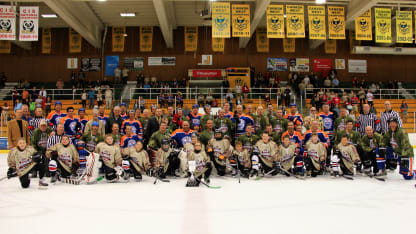
By
Meg Tilley / EdmontonOilers.com
"You're listening to this every day and you're just standing by the phone wondering if the phone was going to ring and you're going to [receive] bad news," said Pelletier.
"It was tough times for everybody that [was] involved, [my brothers] made the decision to enroll and serve but we are also - indirectly - part of that as a family. It's quite challenging."
Between 2005 and 2008, Pelletier's older brother Martin and younger brother Mathieu were completing a tour with the Royal 22e Régiment in Afghanistan, together.
"I remember [Martin], the first time he went to Kabul it was more of a reconstruction mission," said Pelletier, explaining how his eldest brother, now 46, experienced his first tour in Afghanistan in 2004.
"They were trying to help them build schools, trying to help train… their own army, which was at that time an embryo stage. And then his second tour (in 2007-08) - [which was Mathieu's] first tour [in Afghanistan] - there was a lot more battle…. That was extremely challenging for the family, especially my Mom, having both her sons there at the same time."
What started as summer jobs for then-teenagers Martin and Mathieu with the Les Fusiliers du St-Laurent - one of the oldest infantry regiments in Canada - in Rivière-du-Loup, Que., quickly became a passion.
"When you're 16 or 17, you need a summer job and you could go to the drug store and pile [stock] on shelves or you can enlist; for them, I think [the thought process was that] it was kind of a cool way to be outside," said Pelletier.
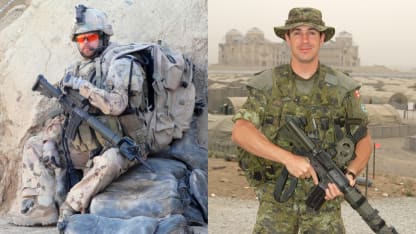
From basic training on infantry to tank driving to week-long camping trips off the grid, Pelletier's brothers were exposed to the realities of what a job with the military would entail.
"The rules are the same, the discipline is the same and I guess there was something that was attractive to their eyes when they both decided to enlist and follow that path."
With most of the reserves members training as soldiers on a part-time basis - the majority of them being students or civilian workers - Martin and Mathieu would continue to report one weekend a month during the winter season.
"They followed their studies at the same time and then I think one day they both made the decision that, 'Why would I do something else, I really love doing what I'm doing?' and [decided to] enlist in the regular army," said Pelletier.
Though Martin committed to the army much sooner than younger brother Mathieu, they found themselves on some of the same tours.
"My older brother did one tour (in 2001) in Bosnia, my younger brother did two," said Pelletier.
"When I competed in the Olympics (in Salt Lake City, February 2002), my younger brother was [still] in Bosnia, so he watched it from there."
Martin and Mathieu may not have grown up on an army base or had a member of their family previously serve in the military, but their exploration into the world and culture of the military dug up a passion they didn't know they had.
"That's the funny part," said Pelletier.
"My parents were both school teachers and they were very high-strung on education and going to university and getting a degree and they had three boys, two turned out as being - Mathieu is a [Ground] Infantry Sergeant and my older brother is a Warrant Officer - and I became a professional figure skater."
GROWING UP MILITARY
For Oilers alumnus Garry Unger, he was immersed in the culture of living the military life from day one.
"My dad spent 35 years in the military," said Unger. "My whole life was in that kind of atmosphere."
Born in Edmonton, Unger grew up in permanent married quarters (PMQ) in Griesbach while his father, Jack, served as a Staff Sergeant with the Royal Canadian Corps of Signals.
"I learned to skate there," said the former centreman. "My dad built a rink out in the back of the yard and it seemed to be cold all winter back then… we could actually skate on the road. They never put any garbage on the road, they didn't put any salt or anything on the road, so we were kind of in our own little environment, which was really kind of neat for the army kids."
In 1953, Garry's sister, Carol Ann, who was five years his junior, contracted Polio.
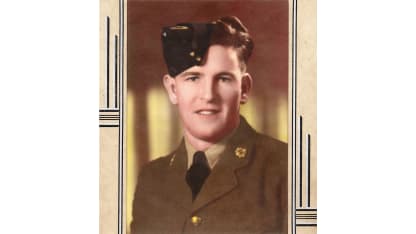
© Photo provided
"[Typical] army families are posted all over the place, [but] because my sister had special doctors… we didn't move around like [many] of these families," said Unger. "I was in Edmonton until I was 12 and then we were posted to Currie Barracks in Calgary, and I stayed there until I went away to play hockey in Ontario."
When the Unger family arrived in the Stampede City, the pre-teen discovered there were a growing number of community hockey teams.
"They were just starting to have more community hockey," he said. "I didn't get involved with [organized sports] in Edmonton because I just skated… with a group of kids that were my age (in the PMQ). When I got to Calgary, the South Calgary [community] had a team, Northwest had a team, and every community had their own little team and we kind of played against each other within the city."
It wasn't until Unger started playing Junior A hockey that he realized he wanted to turn his new-found passion into a career.
"I decided that this is what I wanted to do instead of joining the army," said the 69-year-old.
Although Jack remained posted in Calgary for the rest of his military career, it was Garry's turn to pick up and move, this time across the country, to begin what would eventually become the beginning of his hockey career.
But his pursuit wouldn't be without its challenges.
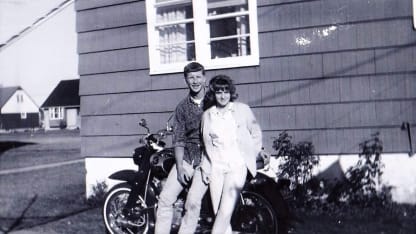
© Photo provided
"I remember one year…. It was the year of the Israeli war in the Middle East, and the Canadian forces were
"The banquet - you go through all sorts of emotion," said Pelletier, who will be participating in his second HHC event in Edmonton.
"It's impressive, it's emotional, it's humbling, you get to rub shoulders with people who are - I look at the life I've led and sacrifices I've made, it's nothing compared to [what they've experienced] - the real true ambassador of our country has always been our military."
Pitting the Oilers Alumni against the Edmonton Garrison Warriors, the unique, family-friendly event returns to Alberta's capital city for a second year to raise funds that will support the PPCLI Foundation and Garrison Military Family Resource Centre (MFRC).
"The [MFRC] looks after these guys, their families, the kids," said Cumyn. "That support group from the Military Family Resource Centre on virtually all of the bases, this one here in Edmonton is special because they're putting their efforts into this to help make it a big success."
The annual event aims to raise funds that will support ill and injured Canadian Armed Forces members, veterans, their families, and families of the fallen.
"This is a big event for the soldiers, for our regiment," said Retired Master Warrant Officer Jim Butters and Head Coach of this year's Garrison Warriors team.
"I had the opportunity to play in three different games and have coached in two of them. It's been a real joy in just getting out and seeing people, the military family playing hockey against their heroes."
The hockey game will be played in St. Albert at Servus Credit Union Place, giving hockey enthusiasts the opportunity to see some great action as well as view four trophies from the Hockey Hall of Fame, including the Conn Smythe, Hart, Art Ross and Canada Cup, which will be on display at the game and available for viewing and photos with a $10 ticket to the game.
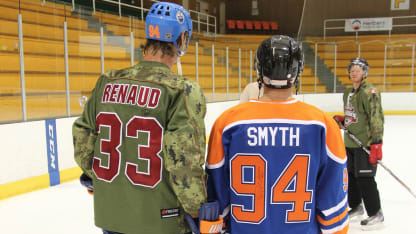
Hayley Wickenheiser will join the military Warriors team, while Ty Gretzky and Gord Bamford will join a star-studded Oilers Alumni team that includes Unger, Ryan Smyth, Andrew Ference, Fernando Pisani and Craig MacTavish. Pelletier will also serve as a member of the Oilers Alumni team.
"The military and the men and women that join the military are joining to protect our country, to give us the freedom to do what we want to do," said Unger.
"It's a huge discipline on their part to say, 'This is what I'm going to do and I'm going to be on call.' Nobody wants to go to Egypt, nobody wants to go to Afghanistan, but if that's what they're called to do, they're on call to do that, and they're doing that to protect us in Canada. I think it's really important for the development of how important the Canadian culture is to us, protect our country.
"I think even though they're military men, part of their culture is hockey as well. When you can put the two together, it makes it for a really good mix."

